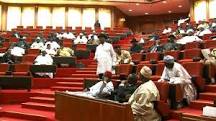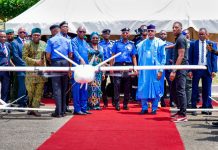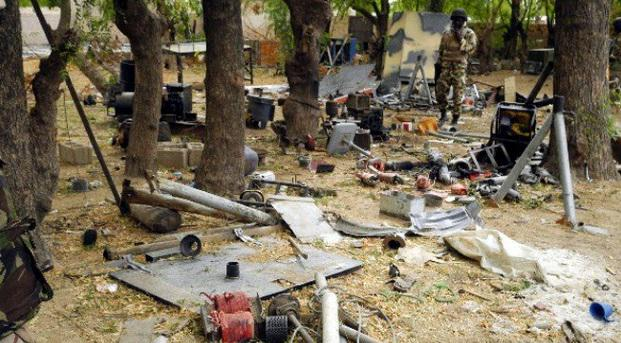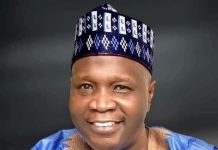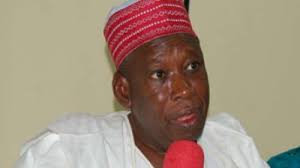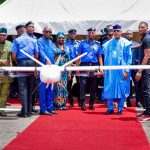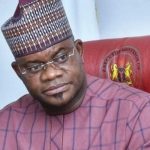By Olusegun Emmanuel, Abuja.
The senate has expressed dissatisfaction with growing activities of the Boko Haram sect in the country and urged Nigerians to remain united in the prosecution of the war against terrorism and agents of instability.
The Upper Chamber also commended the President Goodluck Jonathan’s administration in the area of infrastructure development but urged him to tackle the embarrassing high level of corruption, insecurity and massive unemployment in the country.
Senate stated this in its resolution after deliberating on the motion co-sponsored by the Senate Leader, Victor Ndoma – Egba, and 107 other senators, requesting felicitations for Nigeria as it marks its 15th Democracy Anniversary tomorrow.
Ndoma – Egba noted that the country’s democracy was maturing and that the National Assembly was equally “catalyzing its practice and procedure in line with international best practices.”
He specifically stated that the nation’s democracy was already being felt in sectors like transportation, agriculture, and power, stressing further that the passage of the Petroleum Industry Bill would ultimately transform Nigeria into an economic power.
Senator Smart Adeyemi, in his contribution, argued that democracy remained the best form of government as Nigerians could express themselves freely unlike the situation under the successive military regimes prior to the restoration of civil rule in 1999.
He said, “We are now enjoying freedom of expression and we must appreciate the media for playing a crucial role in that regard. We must also commend the roles played by the late Chief MKO Abiola who laid down his life for all of us to enjoy democracy today.
“There is also no way that we will not appreciate General Abdulsalam Abubakar (rtd) who played a statesmanship role by willingly handed over power.
“At the moment, there is no state or local government that is not better in terms of infrastructure and human capital development than they were during the military era.”
Adeyemi, however noted that the nation was still facing two main challenges of insecurity and unemployment stressing that corruption was being felt everywhere including in the legislature.
He said, “We should not look at the executive at the federal level alone when determining corruption. The legislature is not free either. Even the judiciary where we have conflicting judgement. We should not look at one arm of government.
“The time to restructure the country is now. Nigeria is a big country whereby the unitary security system is failing. The example of the civilian JTF is a good one. We should review the system in the way we are administering our affairs.
“We need to create more states and tackle governors who are misplacing priority. Why should a governor be requesting for social benefits after office for serving his people?”
Senator Ayogu Eze, commended the federal government for doing everything possible to ensure that proper things are done to guarantee credible poll in the country and to “have faith and pride in what are doing as a nation.”
He wondered why some Nigerians are deriving special pleasures in denigrating the government institutions and abusing the president instead of being patriotic.
“We need to rekindle our faith in the country because the country will remain one. Anybody thinking of a divided Nigeria is having a bad dream.” He added.
Senator Abdul Ningi, however argued that Nigeria had remained disunited since the return of democracy in 1999 where by policy makers address issues based on primordial sentiments.
He said, “People are re-elected into the National Assembly based on the godfather they have instead of based on performance. States Assembly are now merely appendages to the state government.”
He also lamented that the executive arm of government had not been treating the resolutions of the National Assembly with necessary seriousness they deserved adding that the appropriation passed since 1999 were not being implemented.
Deputy Senate President, Ike Ekweremadu, noted that there was no railways before 1999 but that the rails are now functioning while many federal roads are also now in good shape.
He said, “There is freedom of speech. We hope the private sector will be fully revamped so that more jobs would be created. Nigeria should step up laws to ensure compliance.
“We have laws against indiscipline and corruption but they not being enforced. The issue of security, unemployment and corruption remained a great challenge. ”
Senator Emmanuel Paulker, maintained that the worst form of democracy remained better than the most benevolent military government and that many social infrastructure are functional especially roads and telecommunications.
” Power is becoming stable which will soon transform the industrial sector. Nigerians have seen dividends of democracy.”
Senator Atiku Bagudu, commended the Independent National Electoral Commission for doing a good job to stabilize democracy but stressed the need “to reduce our current consumption and address insecurity to make our democracy work.”
Senator Kabiru Gaya, said “the issue of corruption is getting worse as democracy grows in the country. The issue of insecurity is also a serious concern to everybody in the country.
We must tackle the issue of unemployment.”
He lamented that the federal government had yet to take action on the plight of many young Nigerians who lost their lives when they were invited for interview across the country for employment by the Nigerian Immigration Service.
“We saw what happened but up till today, we are not seeing any action,” he stated.
Senate President, David Mark, admitted that there was now freedom of expression as Nigerians can now discuss freely as a nation adding that those who attempted that in the past, ran out of the country to avoid punishment.
He said, “What we have gained most in the current dispensation in the last 15 years is the freedom for us to speak freely. Today we can discuss our problems and if we can identify and discuss the problem half of the problem is solved.
“Sixteen, seventeen years ago there was no way in which anybody here, no matter who you are, would have gotten up to criticize the government. One or two persons who did it had to run away for their dear lives.”

